 Petzlover
Petzlover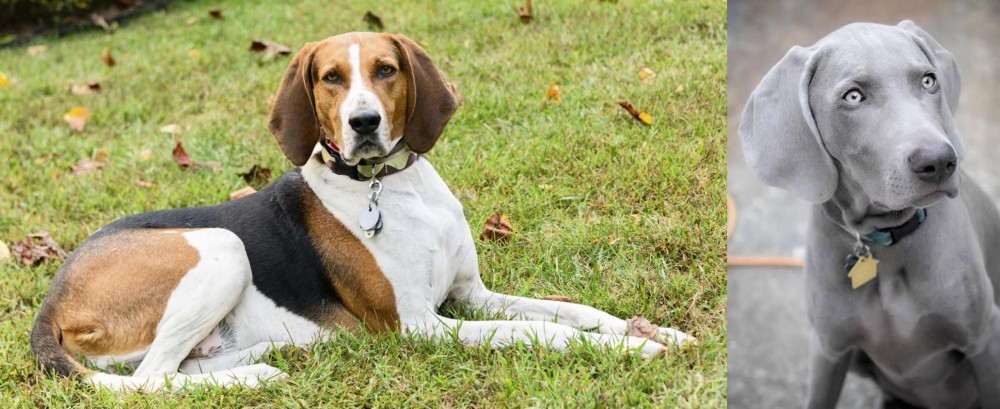 American English Coonhound is originated from United States but Weimaraner is originated from Germany. Both American English Coonhound and Weimaraner are having almost same height. American English Coonhound may weigh 13 kg / 28 pounds lesser than Weimaraner. Both American English Coonhound and Weimaraner has almost same life span. American English Coonhound may have more litter size than Weimaraner. Both American English Coonhound and Weimaraner requires Low Maintenance.
American English Coonhound is originated from United States but Weimaraner is originated from Germany. Both American English Coonhound and Weimaraner are having almost same height. American English Coonhound may weigh 13 kg / 28 pounds lesser than Weimaraner. Both American English Coonhound and Weimaraner has almost same life span. American English Coonhound may have more litter size than Weimaraner. Both American English Coonhound and Weimaraner requires Low Maintenance.
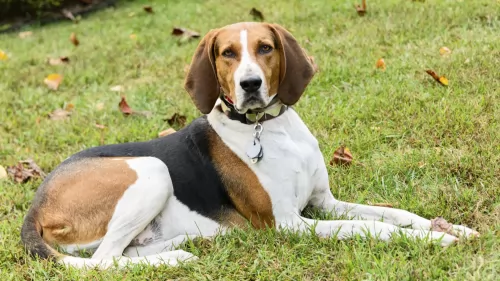 The American English Coonhound was developed in the Southern part of the United States from the variety of English hunting dogs that came to the States with the early settlers. At one point they were known as the Virginia Hound. This breed is well known for its prowess in hunting raccoons and her endurance and speed. Of course as a hound dog he loves to howl during the hunt and at home with the family. He can be frustrated and destructive if his energy and need for a job are not satisfied.
The American English Coonhound was developed in the Southern part of the United States from the variety of English hunting dogs that came to the States with the early settlers. At one point they were known as the Virginia Hound. This breed is well known for its prowess in hunting raccoons and her endurance and speed. Of course as a hound dog he loves to howl during the hunt and at home with the family. He can be frustrated and destructive if his energy and need for a job are not satisfied.
 The Weimaraner is a German breed also know as the Grey Ghost. He was bred to hunt by royalty in the early part of the 19th century. They went after large game including the bear, boar and deer. Once these large game hunts disappeared, the breed became known for hunting small prey like rabbits, fowl and fox.
The Weimaraner is a German breed also know as the Grey Ghost. He was bred to hunt by royalty in the early part of the 19th century. They went after large game including the bear, boar and deer. Once these large game hunts disappeared, the breed became known for hunting small prey like rabbits, fowl and fox.
They are an all-purpose gun dog, hunting, chasing, tracking, pointing and retrieving. They got their name from the city of Weimar in Germany as a favorite of Karl August, the Grand Duke of Saxw-Weimar-Eisenach who hunted with the dogs. They are believed to have descended from either the St. Hubert Hound and Bloodhound, or the Chien-gris dogs.
The breed did not arrive in the United States until the 1920’s. Before that they were barely known outside the city of Weimar. By the 1950’s they were very popular in the States with President Eisenhower having one at the White House.
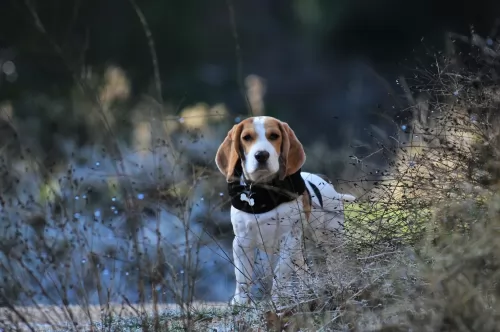 The American English Coonhound is an athlete with a deep chest and cute face. They have broad heads, domed skulls, dark eyes and soft, low ears. They are as fast and athletic as they look. These are highly athletic dogs with long legs and a slim but muscular body. They are so well built for their hunting role, that any deficiencies are quickly identified and bred out of the breed.
The American English Coonhound is an athlete with a deep chest and cute face. They have broad heads, domed skulls, dark eyes and soft, low ears. They are as fast and athletic as they look. These are highly athletic dogs with long legs and a slim but muscular body. They are so well built for their hunting role, that any deficiencies are quickly identified and bred out of the breed.
 A very athletic and elegant breed, muscular and lean, the Weimaraner is built for stamina and speed. They are a very unique looking breed, nick named the Grey Ghost due to the appearance and coloration. The breed has a very short coat that fits like skin over his bone structure. It is smooth and hard and runs from a blue-gray to silver-gray to charcoal-blue. The skin is pink not black, the coat is thin with no undercoat.
A very athletic and elegant breed, muscular and lean, the Weimaraner is built for stamina and speed. They are a very unique looking breed, nick named the Grey Ghost due to the appearance and coloration. The breed has a very short coat that fits like skin over his bone structure. It is smooth and hard and runs from a blue-gray to silver-gray to charcoal-blue. The skin is pink not black, the coat is thin with no undercoat.
They should not be black but they can be a longhaired Weimaraner, according to US AKC Breed Standards. In the AKC standards the tail is docked. This has now been changed in standards around the world as many countries are banning tail docking. They have webbed paws and striking amber, blue-gray or gray eyes. The long haired version can only be produced when both parents carry the recessive gene
 The American English Coonhound knows how to relax just as much as he knows how to work. He is mellow after work and tenacious in the chase. This is not the dog for a first-time owner. They are stubborn and hard to train. They howl and bark at home as much as they do on the hunt. They need a strong pack leader, especially when living in the city or neighborhoods.
The American English Coonhound knows how to relax just as much as he knows how to work. He is mellow after work and tenacious in the chase. This is not the dog for a first-time owner. They are stubborn and hard to train. They howl and bark at home as much as they do on the hunt. They need a strong pack leader, especially when living in the city or neighborhoods.
They are outgoing and friendly and very sensitive. They mature later than most other breeds their size. They are about 2 when they mature.
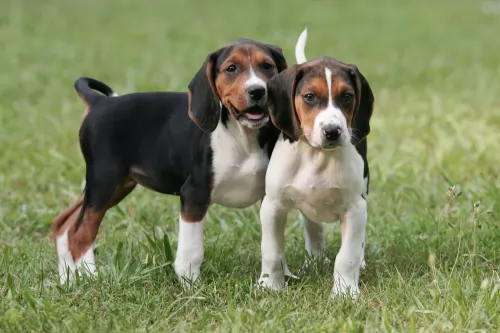 If kept active and happy, the American English Coonhound has very few health problems. The benefit from a large gen pool but do have some health concerns including elbow and hip dysplasia, ear infections, cataracts, bloat, and Progressive Retinal Atrophy. They do have a tendency to gain weight as they age. These issues will be addressed in more detail below. DNA testing is available for the dysplasia and eye issues.
If kept active and happy, the American English Coonhound has very few health problems. The benefit from a large gen pool but do have some health concerns including elbow and hip dysplasia, ear infections, cataracts, bloat, and Progressive Retinal Atrophy. They do have a tendency to gain weight as they age. These issues will be addressed in more detail below. DNA testing is available for the dysplasia and eye issues.
 There are a few conditions and diseases that the Weimaraner is subject to but surprisingly for their size hip dysplasia is rarely one of them. There are prone to
There are a few conditions and diseases that the Weimaraner is subject to but surprisingly for their size hip dysplasia is rarely one of them. There are prone to
Bloat – Gastric torsion when the stomach twists itself and cuts off blood circulation and digestive processes. Bloat is deadly unless caught quickly.
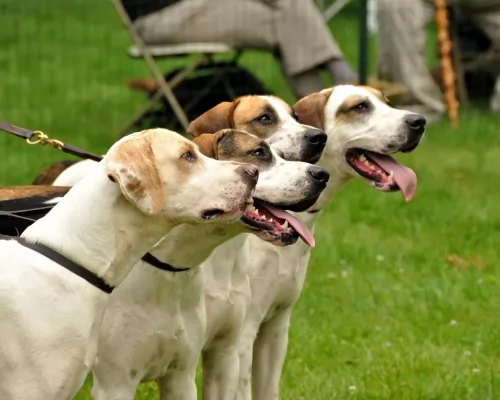 your working American English Coonhound needs different food than one who is not working. So, if you hunt with your dog remember he really needs the calories to keep his energy up. However, they can get obese as they age so cut back with less activity and more years. Watch the number of treats when training.
your working American English Coonhound needs different food than one who is not working. So, if you hunt with your dog remember he really needs the calories to keep his energy up. However, they can get obese as they age so cut back with less activity and more years. Watch the number of treats when training.
Elbow and Hip Dysplasia – the joint issues prevent the bones from connecting and functioning properly. Any good breeder of American English Coonhounds will do tests for both.
Eye issues range from cataracts to PRA (Progressive Retinal Atrophy) Again there are tests available for these conditions.
Bloat is a condition many medium to large size dogs can experience when their stomach can become inverted and intestines distended. The is a situational issue and can’t be predicted. Don’t allow your coonhound to wolf down food right before exercise and feed him more than once a day in a smaller meal.
The American English Coonhound needs a lot of exercise and has an extremely strong work and prey drive.
 1 Feeding the puppy - Feed high quality dog food with high protein but not rich foods. Rich foods cause digestive issues and eating to fast, too soon before or after strenuous exercise do to threat of bloat. Also do not use the raised foot bowls as they hold an even great risk for bloat. Feed puppy 3-4 meals per day.
1 Feeding the puppy - Feed high quality dog food with high protein but not rich foods. Rich foods cause digestive issues and eating to fast, too soon before or after strenuous exercise do to threat of bloat. Also do not use the raised foot bowls as they hold an even great risk for bloat. Feed puppy 3-4 meals per day.
2.Feeding the adult Feed high quality dog food with high protein but not rich foods. Rich foods cause digestive issues and eating to fast, too soon before or after strenuous exercise do to threat of bloat. Also do not use the raised foot bowls as they hold an even great risk for bloat. Feed the adult twice a day.
4. Games and Exercises – This is a very athletic and energetic dog. They need activity and will become destructive without it. They develop separation anxiety very easily. They need both physical and mental stimulation. They are great at agility, course running, field trials and CAT.